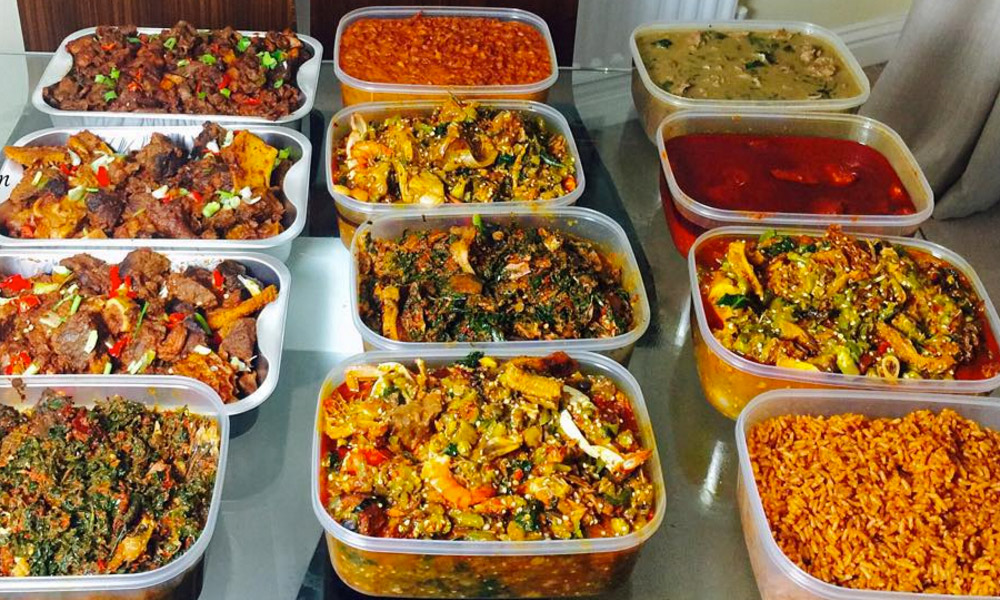Nigerian delicacies are more than just Nigerian food. Nigerian food speaks volume about its people and the Nigerian food culture. Nigerian dishes and snacks are a favourite not just in the country but abroad as well. The Nigerian food history is a story we sometimes wish to be told but its too many years of mouth-watering cuisine From Igbo dishes, to Yoruba, Hausa, Fulani, Efik, Ibibio, Urhobo, Edo, and more, the Nigerian food menu is endless, with a different experience for each taste bud. Nigerian delicacies are perfect for dinner, parties, and general gatherings. There is something for every occasion.
Here are 15 Nigerian delicacies
-
Jollof Rice

Jollof rice is Nigeria’s national delicacy. This meal has gone to war against other countries, battled and come out victorious. This dish is easily the most consumed dish in West Africa. A national treasure, Jollof Rice is served to wine and dine just about anyone, anywhere. Jollof rice is a delicacy that originated from the Senegambian region and gets its name from the Wolof people. It is easily prepared at home with an easy recipe and is served at parties and gathering of all kinds. The jollof rice gets tastier as you reach the bottom of the pot, this is because the bottom of the pot is the sweetest part. Jollof rice can be served with any protein of your choice, be it meat, chicken, fish, coleslaw and a cold beverage.
-
Efo Riro

Efo riro is a south-western Nigerian dish, rich in content. The vegetables that can be used to cook this soup are Efo Shoko or Efo Tete (Green Amaranth). If none of these are available, leafy or frozen spinach is a good substitute. The basic ingredients of this meal include vegetable, assorted meat, red onions, crayfish, palm oil, locust beans, seasoning, habanero peppers, red pepper. Efo riro can be served with eba, pounded yam, fufu or amala. It is also a popular choice for parties.
-
Egusi soup

Egusi soup is made from blended melon seeds. It is a dish widely served in Nigeria and is so tasty. The melon seeds being the main ingredient, other ingredients to make this dish include palm oil, a vegetable of your choice, most people use ugu or spinach, seasoning, beef or chicken and fish, ponmo, crayfish, and more. You can prepare the dish with any ingredient pleases you. Egusi is served at home, at owambe parties and restaurants that serve local Nigerian dishes. Egusi is best served with pounded yam, eba or fufu.
-
Ewedu

Ewedu is referred to as a ‘draw’ soup in Nigeria. This is because of its slimy texture when prepared. Ewedu is a flowering plant grown in tropical African regions, packed with vitamin goodness. Ewedu is present in most Yoruba homes. There is a special broom often called ‘ewedu broom’ used to beat the vegetables in the pot once it comes to a boil. Ewedu is usually served with gbegiri or stew and amala. Amala and ewedu with gbegiri is a must have at a Nigerian wedding.
-
Afang soup

Afang soup is a dish native to south-south Nigeria. This assorted dish is knowing to have heart attack worthy ingredients. Afang is prepared with a generous amount of water leaves and okazi leaves. Other ingredients in this tasty dish include beef, fish, ponmo, kanda, seasoning and palm oil.
-
Banga soup

Banga Soup or Ofe Akwu is native to the Niger Delta and the South Eastern parts of Nigeria. In this regions Banga soup is eaten with either starch, fufu, pounded yam, semolina or garri. The key ingredient of this soup/stew is palm fruit oil extract. This oil extract is different from the regular palm oil used in making soups and stew. The palm fruit oil is extracted at low temperatures and is a mixture of oil and water. In the southern part of Nigeria, Banga Soup is referred to as Ofe Akwu, and is used as a stew served with white rice. Other basic ingredients in this delicacy include scent leaves, beef, fish, onions, seasoning, and crayfish.
-
Tuwo Shinkafa

Tuwo Shinkafa is a northern Nigerian delicacy. Tuwo Shinkafa is a fufu recipe made from a soft rice variety. This soft rice becomes sticky when cooked, making it easy to be mashed together to form a fufu mold. Tuwo Shinkafa is often served with northern Nigerian soups such as Miyan Kuka, Miyan Taushe and can be served with other Nigerian soups as well.
-
Abacha

Abacha often called ‘African Salad´ is one of those meals prepared with lots of ingredients. Abacha is most times not considered a whole meal but rather, an inbetweener. Abacha is prepared with cassava. The cassava tubers are cooked till done then sliced with a special grater. Abacha is not complete without Ugba. In your abacha, you obviously add ugba/ukpaka, palm oil, assorted fish, seasoning, onions and more.
-
Ewa Agonyin

Ewa Agonyin is a popular Yoruba, bean-based dish. This delicacy is simply mashed beans with specially made palm oil sauce/stey. The aroma of the sauce can be perceived from a mile away and this dish is the first pick for the workforce at lunchtime. Ewa Agonyin can be eaten with fried plantain or bread.
-
Moin Moin

Moimoi or Moin-Moin is a Nigerian steamed bean pudding made from a mixture of washed and peeled black-eyed peas, onions and fresh ground peppers. This delicacy is a staple in Nigeria and can be served with almost anything. Moin-Moin can be served on its own, with rice, pap, etc. Different people add their own special touch to moin-moin. Some add a boiled egg in the middle or fish to the mix and more. The best moin-moin is the one wrapped in leaves.
-
Nkowbi

Nkwobi is a south-eastern Nigerian delicacy frequently ordered in exclusive restaurants and served in a calabash or mortar-like dish. Nkowbi is simply cooked cow foot mixed with spicy palm oil paste. Nkwobi is one of the most popular eastern delicacies and is often confused with Isi Ewu. You can enjoy Nkwobi with a nice cool beer, water or drink of your choice.
-
Ogbono Soup

Ogobono soup is another one of the Nigerian delicacies refereed to as draw soup. Like the ewedu, it also has a slimy texture. What makes ogbono soup perfect for swallow, like eba, fufu, amala etc is the slimy texture which makes it easy for the lumps to slide down the throat. Some people like to prepare ogbono with or without an added vegetable and sometimes, some people like to mix with either okra or egusi. For the perfect Ogbono soup, you will need ogbono seeds, assorted meat, fish, seasoning, vegetable leaves (optional), crayfish and palm oil.
-
Ofada rice

Ofada rice is a locally produced type of rice which comes with a unique aroma and flavour. The scent of this rice can be perceived as foul to some in not properly processed or washed. Known to have stones if not properly washed, ofada rice is taste, round and best served with ayamase sauce, also known as ofada stew. This ofada stew is made with spicy palm oil, different types of peppers, locust beans, assorted meat, crayfish, and seasoning. Ofada rice is often served at parties and restaurants
-
Okra Soup

Okra soup can be said to be the third and final draw soup. It is one of the quickest and easiest soups to prepare as it doesn’t require too many ingredients or processing. In Hausa okra soup is referred to as ‘Miyan Kubewa’. Just like other soups, okra can be eaten with garri, fufu, semolina, pounded yam, amala etc. Okra soup is very unique as it is possible to change your choice of condiments and still have a brilliant meal. You can have sea food okra, beef okra, chicken okra or even a vegetarian okra meal.
-
Isi Ewu

Isi Ewu is the second most popular Igbo dish in Nigeria. Isi Ewu which translates to goat head is a delicacy served in exclusive restaurants and joints. The process of preparing Isiewu is so similar to that of Nkwobi that lots of people find it hard to differentiate between both dishes. Isi Ewu is prepared with spices, palm oil, and garnished with assorted vegetables. It is also served in mortars. Isi Ewu is best served with a nice cold beer, water or drink of your choice.






